In this post, we will study the several insights and importance of conservation of mechanical energy examples.
In general, conservation of mechanical energy says that when an object is considered, only conservative forces act on it; at this time, the mechanical energy of that object will be constant. It is the conservation of mechanical energy. In physics, it is generally known as the KE + PE .
Now let us know in detail about the conservation of mechanical energy examples.
Conservation of Mechanical Energy Examples
To know the concept of conservation of mechanical energy more clearly, we can take some examples that are as follows,
- Rolling of a ball
- Hammering a nail
- Dart Game and Gun
- Hydroelectric power station
- Bulldozer or Wrecking ball vehicle
- Cycling
- Revolution of planets around the sun
- Revolution of the Moon around the earth
- Working of Wind Mill
- Working of Electric Motor
- Arrow and the bow
- Roller-Coaster ride
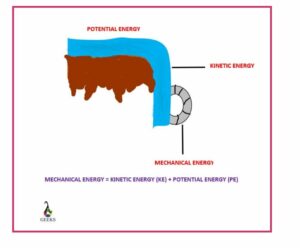
Rolling of a ball
The Rolling of a ball can be conservation of mechanical energy example. In a static position, the ball will contain some stored energy called potential energy; as it starts to move, it gains kinetic energy. As it moves, it hits a target; during this hit, the force applied will be mechanical energy, work takes place. From this, we can say that mechanical energy made the target move.

Hammering a nail
When you want to hammer a nail into a wall to hang some frames, you will hold the nail on the point and apply some force on it using the hammer. Here when the nail is held at rest on the wall, it has PE, and when it starts to move inside, it gains KE. In general, we know that the sum of PE and KE is mechanical energy that causes the nail to move inside the wall. Hence it is a conservation of mechanical energy example.
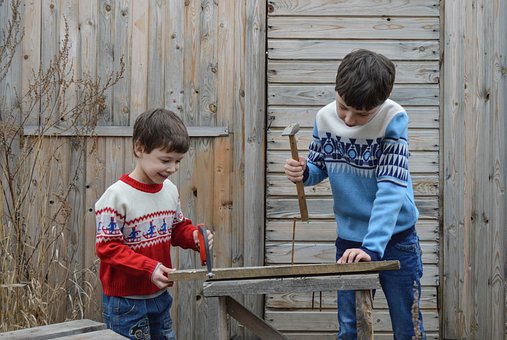
Dart Game and Gun
The gun used to play the dart game is conservation of mechanical energy example. The dart gun contains a spring so that when operated, it can throw a string; in this spring, elastic PE will be stored. When compressed, it gains KE, and a force is applied to throw a dart on the required aim. This force applied is mechanical energy.

Hydroelectric power station
Hydroelectric power stations are the best conservation of mechanical energy examples. In these power stations, electrical energy is converted into mechanical energy with the help of stored and flowing water. The dam or reservoir consists of water stored gravitational potential energy acts in this region.
- When the valve is made to open, the water moves down the pipe, gaining kinetic energy.
- The water moving down goes through the turbine blades present at the exact location of the waterfall.
- Here, the force acting on the turbines is mechanical, which helps rotate the turbine attached to the motor.
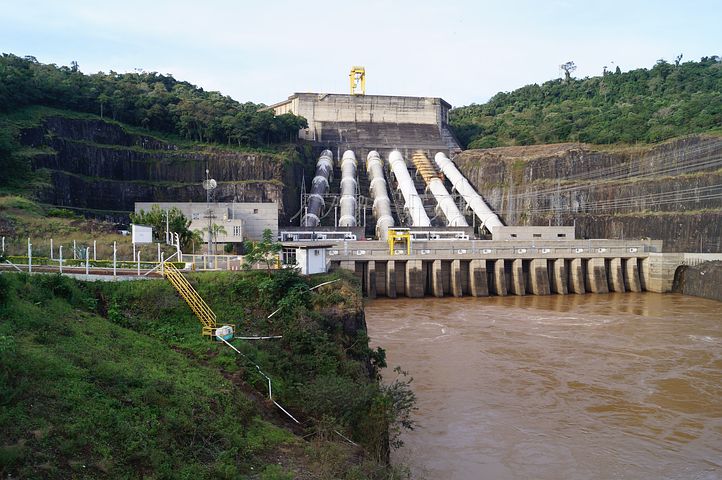
Bulldozer or Wrecking ball vehicle
A vehicle that consists of a giant ball used to demolish a tall building is called a wrecking ball vehicle. The large ball is moved to a certain height; here, it contains stored potential energy, and when it comes down, it has kinetic energy. Now it is moved towards the building to demolish it; here, the mechanical energy force causes the demolition.

Cycling
Cycle riding is one of the prominent conservation of mechanical energy examples. When an individual cycles, they gain some potential energy. The rider uses this energy to move the bicycle paddles; here, mechanical energy is applied. We can observe that the conservation of mechanical energy helps the work to be done.

Revolution of planets around the sun
All planets revolve around the sun for a specific time interval. The planets possess some potential energy at their position concerning the sun.
- When it orbits on its axis, it exhibits some kinetic energy.
- The mechanical energy is formed by taking into account both KE and PE.
- From the laws of conservation of mechanical energy that there will be no forces that will act on it except the gravitational force for a closed system.
- Since there are no external forces in space, the planet-sun system will exhibit mechanical force at different instincts.

Revolution of the Moon around the earth
- Even the moon’s revolution around the earth is the conservation of mechanical energy.
- The moon contains some potential and kinetic energy concerning its position in consideration of the earth’s position.
- From the conservation of mechanical energy, it can be said that there will be a giant mechanical force acting on the moon-earth system.
- It will be constant since there is no frictional or external force in space.

Working of Wind Mill
- Windmills are usually found in the windy regions that are on the hills. It is a device used to generate electrical energy using wind energy.
- It is known to work on the principle and laws of conservation of mechanical energy. Initially, there will be PE on the blades of the windmill fan.
- When the wind is blown, it contains some KE and is blown towards moving the blades. Here, the force applied is the sum of KE and PE, which is mechanical energy that turns the blades and provides them rotation.
- Here the ME is conserved and is conservation of mechanical energy example.

Working of Electric Motor
- The working of Electric motors is based on the principle and laws of conservation of mechanical energy.
- These electric motors can be seen in almost all the electric appliances we use in our daily routine. It is used to convert electrical energy to mechanical energy.
- When we are on an electrical appliance, it gains some amount of both kinetic and potential energy. As it operates, it exhibits a force called mechanical energy that helps in the work, i.e., when we operate a washing machine, it starts to rotate; here, the rotation is due to mechanical energy generated by an electric motor.
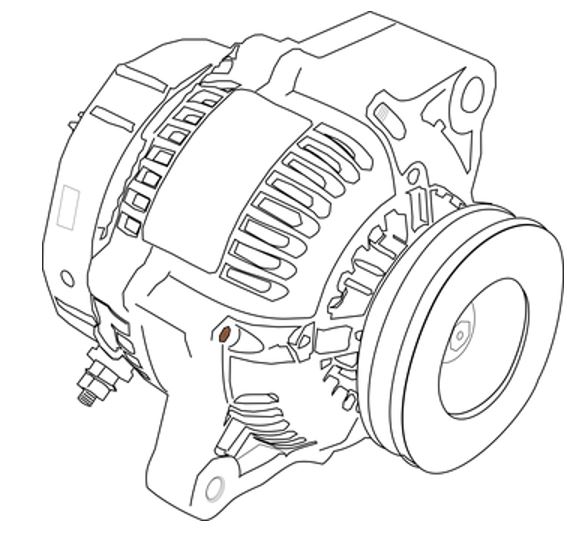
Arrow and the bow
- We used to play the bow and arrow game in our childhood; now, it is surprising to note that it is essential conservation of mechanical energy example.
- When you draw an arrow from the bow, it gains elastic potential energy (PE), and as it is released, it gains kinetic energy (KE). AS we pull the arrow, the more it moves forward to its target when released.
- Together, these energies give the required mechanical energy to the arrow to move towards its target and complete its work.
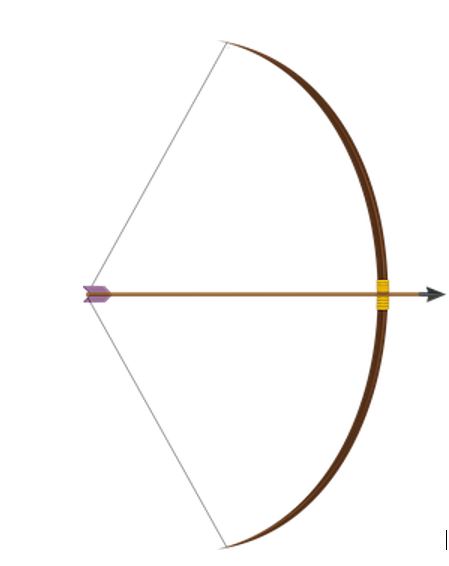
Roller-Coaster ride
- It is fun to ride on a roller coaster, and it is one of the best conservation of mechanical energy examples.
- When the roller coaster is at a certain height, it possesses some PE, and as it moves further, it possesses Kinetic energy.
- It is noticeable that when it moves, the friction does not make it stop because both the energies together form a mechanical force that helps a roller coaster to move and violates external forces resulting in the conservation of mechanical energy.

These are some of the vital conservation of mechanical energy examples.
To know more about types of conservation of energy check below
Frequently Asked Questions | FAQs
What is Mechanical energy?
Mechanical energy is one of the primary forms of energy.
Mechanical energy is the energy that comes into action when objects move. It is found often in everybody that has some potential to move. In physical science, it is known to be formed as a combination of kinetic energy (KE) and potential energy (PE).
Mechanical energy = Kinetic energy + Potential energy
What is Kinetic energy?
Kinetic energy is one of the primary forms of energy observed during motion.
A body is said to be consist of kinetic energy (KE) when it starts to move or when it is in motion. It is also known as the work required to accelerate an object. This kinetic energy usually changes with a change in the object’s speed.
What is potential energy?
Potential energy is also known as stored energy.
In general potential energy is defined as the stored energy that depends on the position of the objects that are in relative positions to each other. The potential energy of any object or body will be increased when stretched or compressed.
What is gravitational potential energy?
We know that the potential energy relies on the position of two different objects.
Similarly, gravitational potential energy is a type of potential energy that considers the relative positions of two massive objects.
State the Law of Conservation of Mechanical Energy?
The principle and the law of conservation of mechanical energy define that when an object falls from a specific meter of height, the only force acting on the body will be gravitation.
- It exhibits both potential and kinetic energy when it is made to fall.
- The sum of both KE and PE is termed mechanical energy or force.
- For the conservation of mechanical energy, the system must be closed, and there should be no external factors acting on the system.
What are the examples of conservation of mechanical energy?
The vital conservation of mechanical energy examples are shown below
- Rotating of a fan
- Riding of a vehicle
- Moving heavy objects
- Working of washing machine
- Working of cranes
- Hitting of baseball
Also, please click to know about 30+ Non Mechanical Energy Examples.
Also Read:
- How to find kinetic energy with force and distance
- How to calculate kinetic energy in a pendulum swing
- Example of electrical energy to heat energy
- How to enhance potential energy usage in mechanical clocks for improved longevity
- How to calculate energy in stochastic processes
- Is static electricity energy
- How to estimate the elastic energy in a bow and arrow for optimal performance
- How to measure energy in a quantum sensor
- How to find energy consumed
- Where to find nuclear energy

I am Raghavi Acharya, I have completed my post-graduation in physics with a specialization in the field of condensed matter physics. I have always considered Physics to be a captivating area of study and I enjoy exploring the various fields of this subject. In my free time, I engage myself in digital art. My articles are aimed towards delivering the concepts of physics in a very simplified manner to the readers.